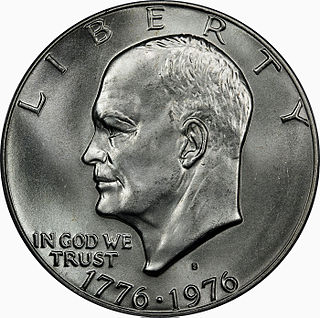 W
WThis article lists all of the station stops made by the American Freedom Train tour in 1975 and 1976.
 W
WAreas of Critical Environmental Concern (ACEC) is a conservation ecology program in the Western United States, managed by the Bureau of Land Management (BLM). The ACEC program was conceived in the 1976 Federal Lands Policy and Management Act (FLPMA), which established the first conservation ecology mandate for the BLM. The FLPMA mandate directs the BLM to protect important riparian corridors, threatened and endangered species habitats, cultural and archeological resources, as well as unique scenic landscapes that the agency assesses as in need of special management attention.
 W
WThe United States Bicentennial coinage is a set of circulating commemorative coins, consisting of a quarter, half dollar and dollar struck by the United States Mint in 1975 and 1976. Regardless of when struck, each coin bears the double date 1776–1976 on the normal obverses for the Washington quarter, Kennedy half dollar and Eisenhower dollar. No coins dated 1975 of any of the three denominations were minted.
 W
WBikecentennial '76 was an event consisting of a series of bicycle tours on the TransAmerica Bicycle Trail across the United States in the summer of 1976 in commemoration of the bicentennial of America's Declaration of Independence. The route crossed ten states, 22 national forests, two national parks, and 112 counties between Astoria, Oregon, and Yorktown, Virginia, a distance of about 4,250 miles (6,840 km). The route was chosen to take cyclists through small towns on mostly rural, low-traffic roads.
 W
WUSS Voge (FF-1047), a Garcia-class frigate of the United States Navy was named after Rear Admiral Richard George Voge. Voge fulfilled a Protection of Shipping (POS) mission as anti-submarine warfare (ASW) combatants for amphibious expeditionary forces, underway replenishment groups and merchant convoys. Voge made notable contributions to submarine 'hold-down' tactics with sister ship Koelsch. A Soviet submarine collided into the Voge in 1976.
 W
WThe Copyright Act of 1976 is a United States copyright law and remains the primary basis of copyright law in the United States, as amended by several later enacted copyright provisions. The Act spells out the basic rights of copyright holders, codified the doctrine of "fair use," and for most new copyrights adopted a unitary term based on the date of the author's death rather than the prior scheme of fixed initial and renewal terms. It became Public Law number 94-553 on October 19, 1976 and went into effect on January 1, 1978.
 W
WThe Foreign Sovereign Immunities Act (FSIA) of 1976 is a United States law, codified at Title 28, §§ 1330, 1332, 1391(f), 1441(d), and 1602–1611 of the United States Code, that establishes the limitations as to whether a foreign sovereign nation may be sued in U.S. courts—federal or state. It also establishes specific procedures for service of process, attachment of property and execution of judgment in proceedings against a foreign state. The FSIA provides the exclusive basis and means to bring a lawsuit against a foreign sovereign in the United States. It was signed into law by United States President Gerald Ford on October 21, 1976.
 W
WFreedom Bell, American Legion, is a public artwork located at Union Station in Washington, D.C., United States. Freedom Bell, American Legion was surveyed as part of the Smithsonian's American Art Museum's Inventories of American Painting and Sculpture database in 1985.
 W
WLet Me Be a Woman: Notes to My Daughter on the Meaning of Womanhood is a 1976 book by Elisabeth Elliot that was published by Tyndale House in Wheaton, Illinois, United States. The book is 185 pages long and is about what is written about women in the Bible. The book also provides advice about marriage. Elliot gave the book to Valerie, her only child, as a gift on the day of her wedding. Elliot used the phrase "Let me be a woman" in response to Christian egalitarianism, which she said was "not a goal to be desired [because] it is a dehumanizing distortion." Her use of the phrase in this manner in 1977 at the National Women's Conference in Houston, Texas evoked considerable applause. The book contains several stories, the first of which telling about how God brought two people together from across the world into a romantic relationship with each other because of their obedience to God's leading. Another story is about the murder of John and Betty Stam, Christian martyrs. A prayer by Betty Stam is also included in the book. The prayer asks that the full will of God be done in her life, irrespective of the cost to herself. In 2003, Andrew Farmer of Crosswalk.com quoted a portion of the book in support of his argument that singleness is a spiritual gift that God gives to single people for the period in which they are single.
 W
WThe Medical Device Regulation Act or Medical Device Amendments of 1976 was introduced by the 94th Congress of the United States. Congressman Paul G. Rogers and Senator Edward M. Kennedy were the chairperson sponsors of the medical device amendments. The Title 21 amendments were signed into law on May 28, 1976, by the 38th President of the United States Gerald R. Ford.
 W
WThe United States Bicentennial was a series of celebrations and observances during the mid-1970s that paid tribute to historical events leading up to the creation of the United States of America as an independent republic. It was a central event in the memory of the American Revolution. The Bicentennial culminated on Sunday, July 4, 1976, with the 200th anniversary of the adoption of the Declaration of Independence.